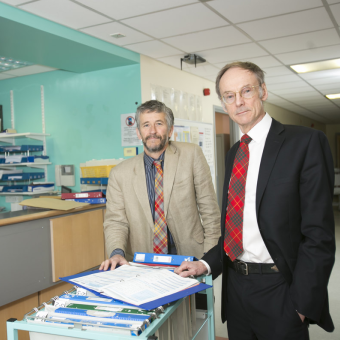A type 2 diabetes diagnosis once meant the start of a lifelong journey learning to live with a serious condition, but our research changed what’s possible.
Remission in people with type 2 diabetes means that their blood sugar levels are below the diabetes range for at least three months without needing to take any glucose-lowering medications.
A remission research revolution

Our type 2 diabetes remission research journey started in 2008, when we funded a study led by Professor Roy Taylor to test if a low-calorie diet could help people living with overweight or obesity put their type 2 diabetes into remission.
Elsewhere, Professor Mike Lean was researching the benefits of a low-calorie diet programme that could be delivered in a GP setting to help people lose weight and keep it off.
After exciting results, we asked Professors Lean and Taylor to team up to design a weight management programme to help people with type 2 diabetes go into remission and stay there. We awarded them our biggest-ever research grant – over £3 million – to test the effectiveness of their programme in a large clinical trial, called the DiRECT study.
The DiRECT route into remission
The first results, in 2017, sent waves of excitement through diabetes and scientific communities. Almost half - 46% - of people with type 2 who received the low-calorie weight loss programme were in remission one year later.
Jez Joseph was diagnosed with type 2 diabetes in 2012. He has been in remission since 2017 after losing over 50kg. He said:
“Getting into remission filled me with a level of power and an immense amount of pride.
“When I was diagnosed at 25, I asked the nurse - ‘how do I get rid of it?’ And she said, ‘you don’t, you just manage it for the rest of your life.’ I just couldn’t accept that was the truth, and thankfully it doesn’t seem to be. Going from being told that to living more time without the condition and medicine is the greatest motivation.”
New DiRECT results in 2023 showed that some people had stayed in remission for at least five years.
Professors Taylor and Lean found the key to remission was weight loss to reduce fat inside the liver and pancreas. This allows the organs to work as they should again to control blood sugar levels.
This led to us fund Professor Taylor’s ReTUNE study, which showed a low-calorie weight loss programme could also help some people with type 2 and lower body weights lose pancreas and liver fat and go into remission.
Other research by Professor Lean focusing on South Asian people showed that weight loss to reduce liver fat was also key to putting their type 2 diabetes into remission.
NHS roll-out
Years of groundbreaking work came to a head in 2023 when NHS England announced it would roll out its DiRECT-inspired Type 2 Diabetes Path to Remission Programme across England. Giving thousands of people living with overweight or obesity and a diagnosis of type 2diabetes the chance to put their type 2 into remission.
Similar programmes are also available in Wales, Scotland and Northern Ireland.
Professor Mike Lean, University of Glasgow, co-lead of DiRECT said:
“People with type 2 diabetes, and healthcare professionals, have told us their top research priority is ‘can the condition be put into remission or cured.’ We can now say, with respect to remission, that yes it can, and that at least some of its complications can be checked. Now we must focus on helping more people achieve substantial weight loss as soon as possible after diagnosis, and to maintain their weight loss and stay in remission.”
What's next?
We know that a DiRECT style approach to remission isn't suitable or doesn't work for everyone with type 2 diabetes though. So, we're investing in research to find other ways to go into remission, giving more people the best chance to benefit.
This includes our NewDAWN study. Led by Professor Susan Jebb, researchers are developing a new NHS support service that will offer a range of weight loss diets. We hope it will help everyone who could benefit find an approach that suits them.
And with the number of children and young people with type 2 diabetes rising in the UK, we urgently need to find treatments that could offer them the chance of remission too. So, we’re funding Dr Pooja Sachdev to lead the first study exploring if a low-calorie weight management programme is the right approach for teenagers with type 2.
We’re also working to make sure people with type 2 who aren’t taking part in research or remission programmes are supported on their remission journey and have access to all the information they need.
